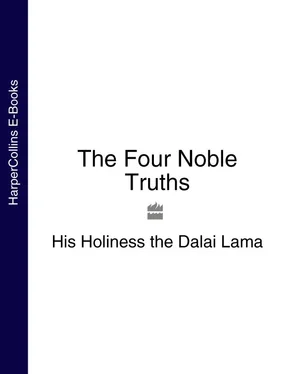Литагент HarperCollins - The Four Noble Truths
Здесь есть возможность читать онлайн «Литагент HarperCollins - The Four Noble Truths» — ознакомительный отрывок электронной книги совершенно бесплатно, а после прочтения отрывка купить полную версию. В некоторых случаях можно слушать аудио, скачать через торрент в формате fb2 и присутствует краткое содержание. Жанр: unrecognised, на английском языке. Описание произведения, (предисловие) а так же отзывы посетителей доступны на портале библиотеки ЛибКат.
- Название:The Four Noble Truths
- Автор:
- Жанр:
- Год:неизвестен
- ISBN:нет данных
- Рейтинг книги:4 / 5. Голосов: 1
-
Избранное:Добавить в избранное
- Отзывы:
-
Ваша оценка:
- 80
- 1
- 2
- 3
- 4
- 5
The Four Noble Truths: краткое содержание, описание и аннотация
Предлагаем к чтению аннотацию, описание, краткое содержание или предисловие (зависит от того, что написал сам автор книги «The Four Noble Truths»). Если вы не нашли необходимую информацию о книге — напишите в комментариях, мы постараемся отыскать её.
The Four Noble Truths — читать онлайн ознакомительный отрывок
Ниже представлен текст книги, разбитый по страницам. Система сохранения места последней прочитанной страницы, позволяет с удобством читать онлайн бесплатно книгу «The Four Noble Truths», без необходимости каждый раз заново искать на чём Вы остановились. Поставьте закладку, и сможете в любой момент перейти на страницу, на которой закончили чтение.
Интервал:
Закладка:
THE FOUR
NOBLE TRUTHS
Fundamentals of the Buddhist Teachings
His Holiness the XIV Dalai Lama
translated by Geshe Thupten Jinpa edited by Dominique Side
 CONTENTS
CONTENTS
Title Page THE FOUR NOBLE TRUTHS Fundamentals of the Buddhist Teachings His Holiness the XIV Dalai Lama translated by Geshe Thupten Jinpa edited by Dominique Side
Preface by Kesang Y Takla PREFACE In July 1996, His Holiness the Dalai Lama gave a series of lectures on Buddhist thought and practice at the Barbican Centre in London. These talks were facilitated by the Network of Buddhist Organisations in U.K. – a national association of Buddhist Centres. The central theme of His Holiness the Dalai Lama’s lectures at the Barbican Centre, which form the core of this book, is the Buddhist teaching on the principle of the Four Noble Truths, which is the foundation of all Buddha’s teachings. In these talks, His Holiness presents a comprehensive explanation of the subject, helping us to gain a better understanding of the Four Noble Truths. The appendix, ‘Compassion – the Basis for Human Happiness’, is the text of a general public talk by His Holiness at the Free Trade Centre in Manchester. This was organized by the Tibet Society of U.K. – which is one of the oldest Tibetan Support organizations. This chapter on compassion complements the teachings on the Four Noble Truths beautifully as it illustrates how the teachings of the Buddha can be applied in our day-to-day life. As His Holiness the Dalai Lama’s central message in these talks is compassion and the teachings on how to live a life of human kindness, it is our hope that this book will be of interest and benefit to people of all faiths and also those who do not share in any religious faiths. The Office of Tibet in London would like to thank Cait Collins and Jane Rasch for transcribing the tapes of the talks, and Dominique Side and the translator Geshe Thupten Jinpa for editing the manuscript for publication. Kesang Y. Takla (Mrs)Representative of H. H. the Dalai LamaLondon
Introduction
1 Introducing The Four Noble Truths
2 The Truth of Suffering
3 The Truth of The Origin of Suffering
4 The Truth of Cessation
5 The Truth of The Path
Appendix: Compassion, The Basis for Human Happiness
Glossary
Recommended Reading
About the Author
Notes
Copyright
About the Publisher
PREFACE
In July 1996, His Holiness the Dalai Lama gave a series of lectures on Buddhist thought and practice at the Barbican Centre in London. These talks were facilitated by the Network of Buddhist Organisations in U.K. – a national association of Buddhist Centres.
The central theme of His Holiness the Dalai Lama’s lectures at the Barbican Centre, which form the core of this book, is the Buddhist teaching on the principle of the Four Noble Truths, which is the foundation of all Buddha’s teachings. In these talks, His Holiness presents a comprehensive explanation of the subject, helping us to gain a better understanding of the Four Noble Truths.
The appendix, ‘Compassion – the Basis for Human Happiness’, is the text of a general public talk by His Holiness at the Free Trade Centre in Manchester. This was organized by the Tibet Society of U.K. – which is one of the oldest Tibetan Support organizations. This chapter on compassion complements the teachings on the Four Noble Truths beautifully as it illustrates how the teachings of the Buddha can be applied in our day-to-day life.
As His Holiness the Dalai Lama’s central message in these talks is compassion and the teachings on how to live a life of human kindness, it is our hope that this book will be of interest and benefit to people of all faiths and also those who do not share in any religious faiths.
The Office of Tibet in London would like to thank Cait Collins and Jane Rasch for transcribing the tapes of the talks, and Dominique Side and the translator Geshe Thupten Jinpa for editing the manuscript for publication.
Kesang Y. Takla (Mrs)Representative of H. H. the Dalai LamaLondon
 INTRODUCTION
INTRODUCTION
The Four Noble Truths are the very foundation of the Buddhist teaching, and that is why they are so important. In fact, if you don’t understand the Four Noble Truths, and if you have not experienced the truth of this teaching personally, it is impossible to practise Buddha Dharma. Therefore I am always very happy to have the opportunity to explain them.
Generally speaking, I believe that all the major world religions have the potential to serve humanity and develop good human beings. By ‘good’ or ‘nice’, I don’t mean that people look good; I mean that they have a good and more compassionate heart. This is why I always say that it is better to follow one’s own traditional religion, because by changing religion you may eventually find emotional or intellectual difficulties. For example, here in England the traditional religious culture is Christian, so it may be better for you to follow that.
However, for those of you who really feel that your traditional religion is not effective for you, and for those who are radical atheists, then the Buddhist way of explaining things may hold some attraction. Maybe in this case it is all right to follow Buddhism – generally, I think it is better to have some kind of religious training than none at all. If you really feel attracted to the Buddhist approach, and the Buddhist way of training the mind, it is very important to reflect carefully, and only when you feel it is really suitable for you is it right to adopt Buddhism as your personal religion.
There is another very important point here. Human nature is such that sometimes, in order to justify our adoption of a new religion, we may criticize our previous religion, or our country’s traditional religion, and claim it is inadequate. This should not happen. Firstly, although your previous religion may not be effective for you, that does not mean it will completely fail to be of value to millions of other people. Since we should respect all human beings, we must also respect those who are following different religious paths. Furthermore, your previous religion – like all religions – does have the potential to help certain types of people. It is clear that for some people the Christian approach is more effective than the Buddhist one. It depends on the individual’s mental disposition. We must therefore appreciate that potential in each religion, and respect all those who follow them.
The second reason is that we are now becoming aware of the many religious traditions of the world, and people are trying to promote genuine harmony between them. One example of this is the interfaith gathering in Assisi in 1986 1 on religions and the environment. I think there are now many interfaith circles and the idea of religious pluralism is taking root. This is a very encouraging sign. At such a time, when people are promoting genuine religious understanding in many areas, a single individual’s criticism can be very harmful. So on these grounds, we should maintain a spirit of respect for other religions.
I wanted to begin with these points, because when I actually explain the Four Noble Truths, I have to argue the Buddhist way is the best! Also, if you were to ask me what the best religion is for me personally, my answer would be Buddhism, without any hesitation. But that does not mean that Buddhism is best for everyone – certainly not. Therefore, during the course of my explanation, when I say that I feel that the Buddhist way is best, you should not misunderstand me.
Читать дальшеИнтервал:
Закладка:
Похожие книги на «The Four Noble Truths»
Представляем Вашему вниманию похожие книги на «The Four Noble Truths» списком для выбора. Мы отобрали схожую по названию и смыслу литературу в надежде предоставить читателям больше вариантов отыскать новые, интересные, ещё непрочитанные произведения.
Обсуждение, отзывы о книге «The Four Noble Truths» и просто собственные мнения читателей. Оставьте ваши комментарии, напишите, что Вы думаете о произведении, его смысле или главных героях. Укажите что конкретно понравилось, а что нет, и почему Вы так считаете.












